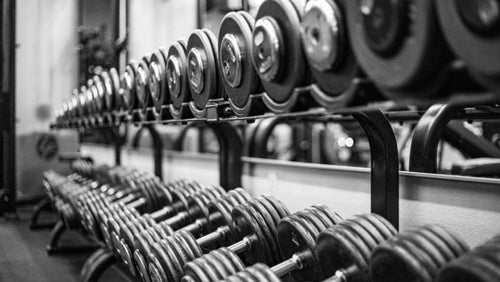
Functional fitness is a form of exercise based around everyday movements like pushing, pulling, and squatting, and includes a wide variety of different training methods, including cardio, high-intensity training, and weightlifting.
No matter your goal, nailing the fundamentals of nutrition is vitally important for functional fitness. These nutrition tips will help improve your fitness and boost your exercise performance.
Why is nutrition important to functional fitness?
Nutrition is vitally important for nearly every aspect of functional fitness. Whether it's fuelling your training to maximise every session, enabling the fastest recovery possible or optimising body composition.
Ensuring you have a well-balanced diet with the right number of macronutrients and micronutrients will also help with injury prevention and good general health.

How to Use Nutrition to Improve Your Functional Fitness
Consume plenty of protein
For body composition and sporting performance, consuming enough protein is essential. (1) Protein helps you to build muscle, recover properly from exercise and can even help you to manage your appetite.
Your recommended protein intake will vary based on your goal. If your wish is to build muscle, an intake of 1.6g per kilogram of body weight per day is best as it will also allow for optimal carbohydrate intake.
If fat loss is your aim, an intake around 2-2.5 grams per kilogram of body weight per day is more suitable as this will help manage your appetite and prevent muscle loss while in a calorie deficit. (1)
The best protein sources are from those with a high percentage of essential amino acids. These include chicken, egg, pork, beef and whey.
If you’re managing your calories, it is best to focus on lean protein sources as these will have a lower fat content and fewer calories. Sources include white fish, such as cod and haddock, and lean cuts of meat.
Stay hydrated
Good hydration is crucial for performance, recovery and general wellbeing. Dehydration has also been shown to reduce strength and power when performing high intensity exercise. (2)
The exact amount of water you need to drink every day depends on your body weight, sweat rate and activity levels. But as a general rule, men should consume about 2.5L per day and women should drink about 2L per day. (3)
Plain water is the best drink for staying hydrated, but most drinks contribute to hydration. Tea, coffee, cordial, milk and sports drinks all contain water. You can also get water from food sources like fruit and vegetables.
Water has also been shown to be a natural appetite suppressant and can aid with weight loss. (4) For those managing their calorie intake, staying hydrated may help reduce snacking and total daily calorie consumption, which will increase the likelihood of fat loss.
Here's some more important information on water intake:

Lifting Weights Could Help You Live Longer, Study Finds
Another reason to hit the weights......
Caffeine
Caffeine can help improve mental alertness, time to exhaustion and perception of pain. (5) This makes it an effective aid to help you get the best of each training session. However, it’s important not to overdo it and recommended that you do not consume more than 400mg at one time. (6) For context, a typical coffee contains around 90mg (depending on how it’s made) and a typical double espresso contains approximately 125mg. (7)
In order to get the biggest benefit from caffeine, it should be consumed 60 minutes prior to a workout. If you are sensitive to caffeine, you should avoid it in the afternoon as it has a long half-life (between 5 and 10 hours depending on the individual) and can affect sleep. (8)
Sources of caffeine include tea, coffee, green tea, diet soda and even some chocolate. You can also supplement caffeine, which may enable you to regulate your caffeine intake more accurately.
Supplement vitamin D during the winter
Vitamin D is a vitally important micronutrient with key roles in the body, including bone density and immune health. (9) However, dietary sources are sparse, and most of our vitamin D is absorbed from sunlight.
In winter months, this means we are at risk of being deficient so supplementing vitamin D during this time may help your immune system fight off any infectious germs that can reduce training time and knock you off your training plan. 10 micrograms of vitamin D per day during the winter should be enough to keep your levels topped up. (9)
Don’t drop carbohydrates too low
Carefully planning your carbohydrate intake can help optimise both your performance and body composition. Adapting your carbohydrate intake to suit your training is the best way to do this. (10)
For example, on days when you are working at a high intensity and training load, you want to eat more carbs. And on days when you have a lower training intensity, like a skill-based lifting session, you want to eat fewer carbs.
Avoid missing meals
Consuming regular meals throughout the day is important to fuel those all-important training sessions and ensure you are recovering properly. Making sure each of your meals contains an appropriate amount of protein is also important for many reasons.
Distributing protein throughout the day is the best way to build muscle, and for those focusing on body composition, regular doses of protein will also help manage appetite and total daily calorie intake. (1)
Regular meals will also help to periodise your carbohydrate intake around your training sessions. Regular meals containing a wide variety of different vegetables will also help reduce the risk of any micronutrient deficiencies.
Take Home Message
Following these nutrition fundamentals will enhance your functional fitness training, improve your exercise performance and help improve your body composition. These include consuming the appropriate amount of protein and carbohydrates, following a regular meal routine, staying hydrated and utilising effective supplements.
Got some more time?
READ THESE NEXT:

Long Distance Running: Four Week Training Plan

Lifting Weights Could Help You Live Longer, Study Finds
Another reason to hit the weights......

- Jäger, R., Kerksick, C.M., Campbell, B.I. et al. International Society of Sports Nutrition Position Stand: protein and exercise. J Int Soc Sports Nutr 14, 20 (2017). https://doi.org/10.1186/s12970-017-0177-8
- Judge LW, Bellar DM, Popp JK, Craig BW, Schoeff MA, Hoover DL, Fox B, Kistler BM, Al-Nawaiseh AM. Hydration to Maximize Performance and Recovery: Knowledge, Attitudes, and Behaviors Among Collegiate Track and Field Throwers. J Hum Kinet. 2021 Jul 28;79:111-122. doi: 10.2478/hukin-2021-0065. PMID: 34400991; PMCID: PMC8336541
- EFSA Panel on Dietetic Products, Nutrition and Allergies (NDA) (201) Scientific Opinion on Dietary reference values for water. EFSA Journal 8(3): 1459
- Thornton SN. Increased Hydration Can Be Associated with Weight Loss. Front Nutr. 2016 Jun 10;3:18. doi: 10.3389/fnut.2016.00018. PMID: 27376070; PMCID: PMC4901052.
- Goldstein, E.R., Ziegenfuss, T., Kalman, D. et al. International society of sports nutrition position stand: caffeine and performance. J Int Soc Sports Nutr 7, 5 (2010). https://doi.org/10.1186/1550-2783-7-5
- 2015-2020 Dietary Guidelines for Americans. U.S. Department of Health and Human Services and U.S. Department of Agriculture. https://health.gov/our-work/food-nutrition/2015-2020-dietary-guidelines/guidelines. Accessed Feb. 1, 2020
- https://www.bda.uk.com/resource/coffee-and-health-it-s-not-just-about-the-caffeine.html
- Drake C, Roehrs T, Shambroom J, Roth T. Caffeine effects on sleep taken 0, 3, or 6 hours before going to bed. J Clin Sleep Med. 2013 Nov 15;9(11):1195-200. doi: 10.5664/jcsm.3170. PMID: 24235903; PMCID: PMC3805807
- He, Cheng-Shiun; Yong, Xin H. Aw; Walsh, Neil P.; Gleeson, Michael (2016): Is there an optimal vitamin D status for immunity in athletes and military personnel?. Loughborough University. Journal contribution. https://hdl.handle.net/2134/23554
- mpey SG, Hearris MA, Hammond KM, Bartlett JD, Louis J, Close GL, Morton JP. Fuel for the Work Required: A Theoretical Framework for Carbohydrate Periodization and the Glycogen Threshold Hypothesis. Sports Med. 2018 May;48(5):1031-1048. doi: 10.1007/s40279-018-0867-7. PMID: 29453741; PMCID: PMC5889771








